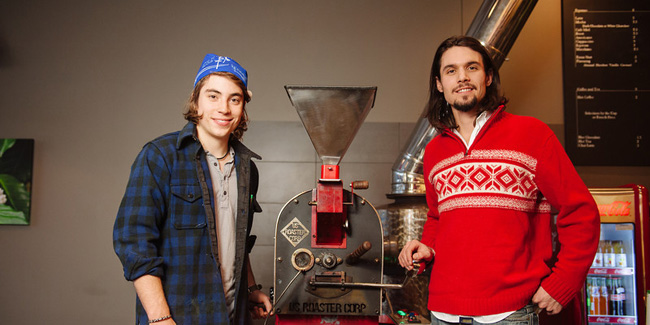
First, a disclaimer: Coffee roaster and barista Eric Faust (above, right) has a history with The Heavy Table. He’s been writing about coffee and beer for us since his debut in early 2009, a story about Cahoots Coffee Bar (“one of the few authentic Middle Eastern cafes in St. Paul”).
But in recent months, Faust’s journalistic output (measured in words) has tapered off at a rate perfectly proportionate to the rise (measured in pounds) of coffee that he roasts each month. In the four years since he created the Duluth Coffee Company logo and brand, he has moved from passionate home-roasting dabbler to micro-roasting specialty merchant to full-time proprietor of a sleek new cafe and roastery in downtown Duluth.
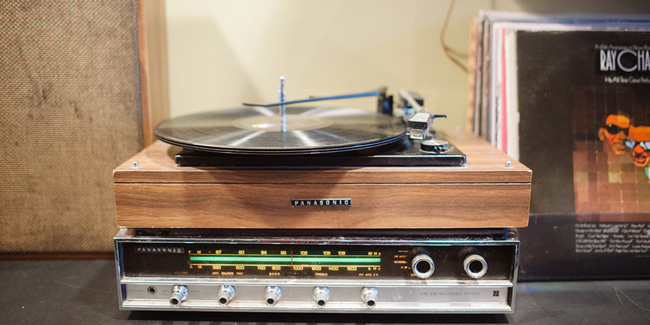
If you step into the Duluth Coffee Company, you’re struck by two things. One, the space — with its neatly trimmed, red- and black-accented industrial vibe — could be equally at home in Jack London Square in Oakland, CA or in Park Slope, Brooklyn. Two, despite the crisp edges, the place is welcoming, with a bar that invites sitting, lingering, and customer-barista interaction. It’s a chilled out mood that’s amplified by the cafe’s record player, which was cranking out vintage R&B during our visit.
Faust’s training includes conducting a roasting project at the University of Minnesota Duluth, judging at the United States Barista Competition, studying at the Counter Culture training center in Atlanta, and a roasting and brewing apprenticeship at Black Sheep Coffee Cafe in South St. Paul.
THE HEAVY TABLE: Let’s start with fundamentals. What makes a good cup of coffee?
ERIC FAUST: For me, it’s all about balance. Coffee can be one of the most bitter and acidic tastes in the world, and that can be very off-putting. But when that’s controlled and it’s balanced by sweet flavors and sour notes, that’s the perfect cup of coffee.
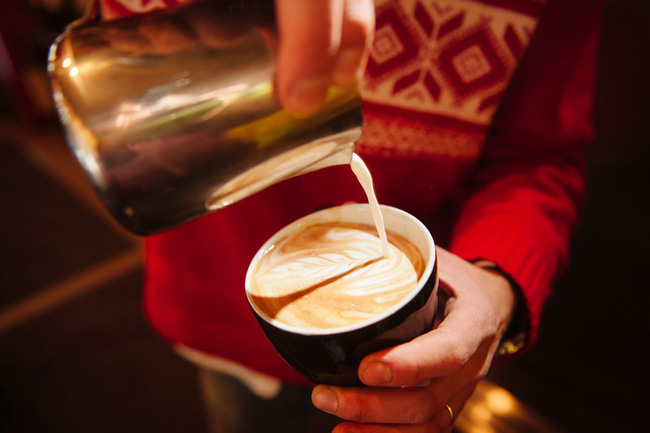
That balance is what makes people say, “that’s a good cup of coffee,” whether they can identify what that is, or not. For me, blending that science and art became an obsession. I just had to keep doing it and doing it, and that pushed me out of the hobby realm into the professional realm.
HT: You’ve described your cafe as “Third Wave.” What does that mean?
EF: We’re definitely Third Wave in the way that we view coffee as culinary. We view coffee as something where the terroir impacts it, as does the person at origin, and the person at roast level, and at brew level. We take all of that extremely seriously.
But Third Wave has also gone a little off the deep end, in the way that some people have taken coffee from being something that’s so universal and made it elitist.
HT: So you’re working against that trend?
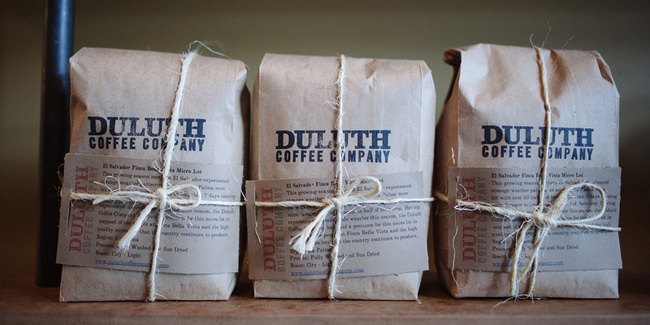
EF: We’ve tried to really break it down here — we see the suit-wearers and the hipsters all in the same space. That’s because they appreciate good, balanced coffee. The phrase we’ve coined is “good coffee for good people.” It’s not coffee where the story is what’s good about it, because a good story doesn’t necessarily translate to good coffee.
It can be from the highlands of some small village in Kenya, but it could taste like sewage, or… tomato soup. I hate tomato soup coffee. Many Third Wave cafes are very into light roast — it’s light roast or bust. [Some roasters will] roast coffee so light that they refuse to appreciate the qualities that a roast can bring into it. There’s a time and place for that, but it’s worth noting that a dark roast coffee can be done well.
HT: How has the reception to the cafe been thus far?
EF: People say exactly what I want them to say: “This is just good coffee.” It’s not like, “This is something I’ve never tasted before.” They’ve tasted good coffee, and we bring that consistently. The response has been great. We’re almost pushing 1,000 pounds a month, which is very micro. But for a roaster that does five-pound batches, that’s good.
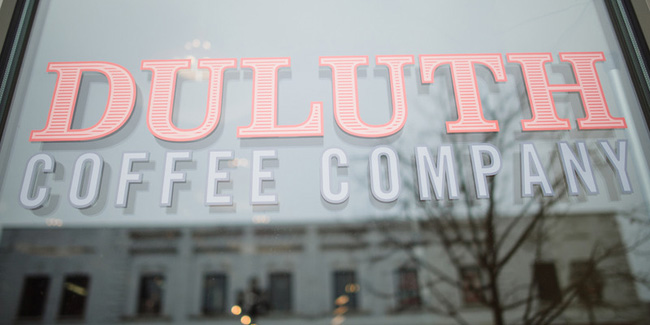
HT: What’s the long-term goal for the roastery?
EF: I want to someday be running a 50-pound roaster. I want to be the roaster for this region of Minnesota. It’s important that coffee shops have the support of a good roaster that’s in proximity so they can have that education.
Coffee shop owners don’t necessarily open the shop for the coffee, but they still want to sell a good product, and I feel like the Cities is too far for all those coffee shops up the Shore and up in the Iron Range. They should come to the city of Duluth and purchase coffee from the Duluth Coffee Company. I’d like to push 4,000 to 5,000 pounds a month, and that’s for purchasing power. When we get that kind of movement of product, we can have much more of an impact at origin — we can select bags.
HT: Your specialty drinks go out with latte art on them. What’s the story behind that?
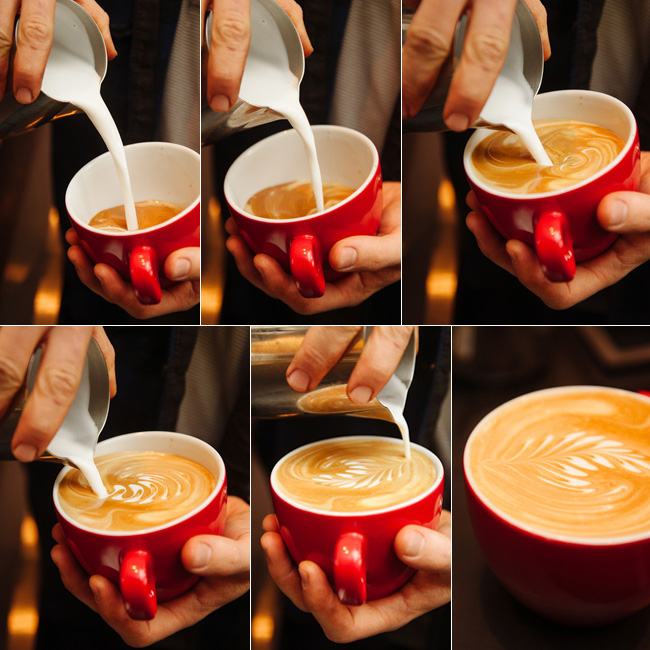
EF: Latte art is kind of a holy grail of baristas — for most people it looks cool, but it’s a signifier of quality microfoam. You can’t pour it unless you’ve frothed the milk right. When you’ve frothed the milk right, you’ve cooked the proteins, you’ve sweetened the milk, and you’ve homogenized the froth. [Duluth Coffee Company Barista] Matt (pictured in top photo, at left) — he picked up on it after eight gallons… It’s a short investment to make sure they’re doing it right. And now he puts out drinks and they always have a rosetta or a heart on it, and I know they’re going out right.
HT: You’ve got coffee on hand for people who want a quick cup, but you also do by-the-cup brewing, yes?
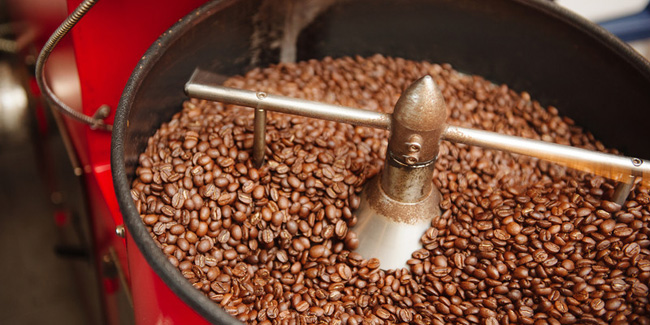
EF: The Third Wave is all about this brew-by-the-cup stuff. When Dogwood was running [the coffee at] Rustica, you could get any coffee and any brewing method…
HT: I remember that. I didn’t know how to deal with it; it was actually pretty overwhelming.
EF: I’m a coffee snob, and I didn’t know how to deal with it! There were so many variables. I enjoy simplicity. I want people to find the brewing method that fits their lifestyle, so I decided to change the brewing method every day of the week, so when people come in a certain day of the week, they’ll see that. I’m planning to Facebook it, too, as we go.
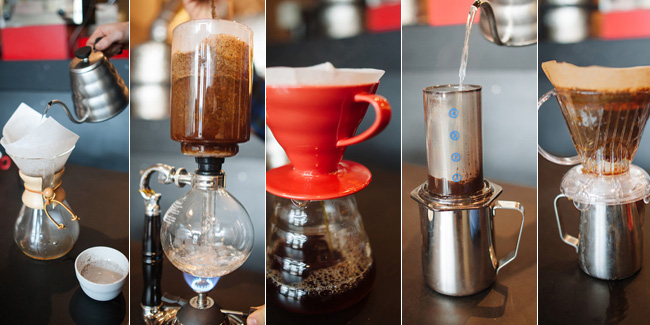
Monday is Chemex. Tuesday is siphon. Wednesday is pour over. Thursday is AeroPress. And Friday is the Clever Dripper. For me, I enjoy ’em all. Some people say, “This method is good for this coffee,” and I don’t know if I agree with that. Brewing method should be about what fits your lifestyle.
Every morning I drink a French press. That’s the first one down the hatch. Then I have an espresso. The Chemex is aesthetic and sexy. The Clever is bombproof … you can drop it on the ground. The Clever is great because my wife uses it at home while she’s chasing the kid around…
HT: You do some blended drinks, correct?
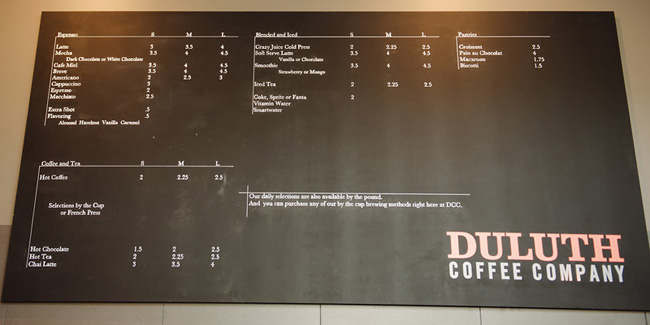
EF: Yeah, we’re making our own simple syrups here. Last week we did a Turkish latte, which was a cardamom honey latte. It took off. This week we made a butter-rum simple syrup and I did a butter-rum breve. We’ll stay within the realm of approachability but be unique. We’re trying to introduce things that push people’s boundaries.
I don’t know what Andrew Kopplin would say about this place — we have a blended coffee drink on our menu. But we make our own simple syrup, and our blended drink, it rocks. So why not?
Duluth Coffee Company
Cafe and roastery in Duluth, MN
105 E Superior St
Duluth, MN 55802
(Phone number not yet active)
OWNER: Eric Faust
HOURS:
Mon-Sat 6:30am-2pm
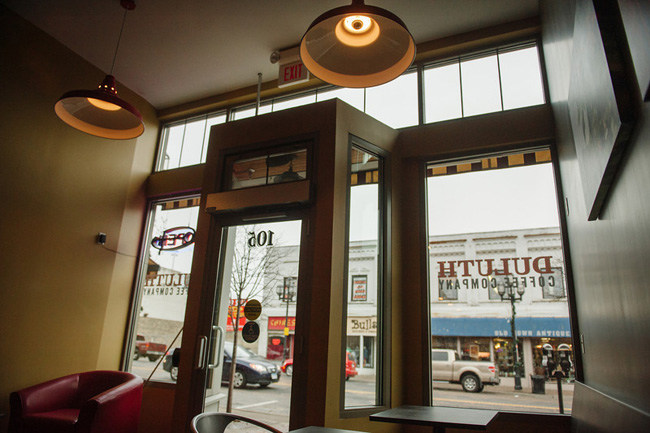

Comments are closed.